#Cape Bedford
Text
CAPE BEDFORD TO FLINDERS ISLAND
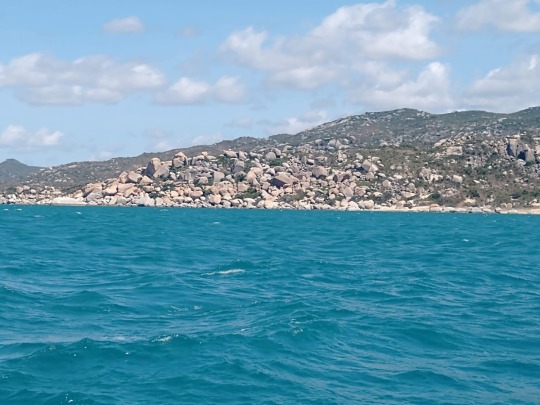
View On WordPress
#boulders#Cape Bedford#Cape Melville#Captain Cook#Cooktown#dolphins#Endeavour#Flinders Island#Kiwigrip#Lizard Island#Low Island#Owen Channel#Stokes Bay#Whales
0 notes
Text


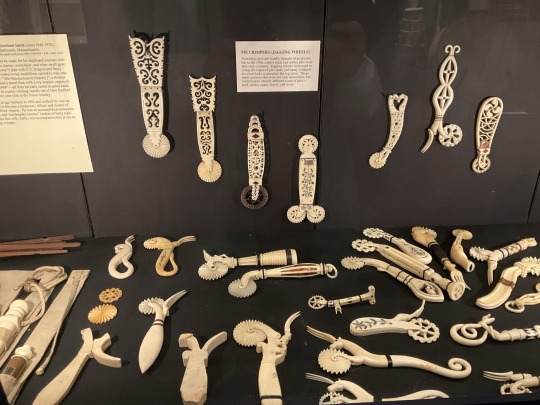

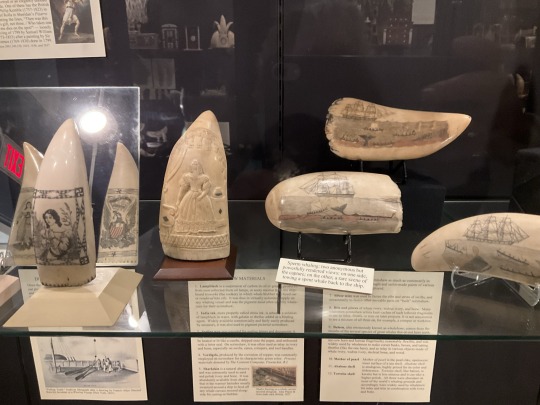
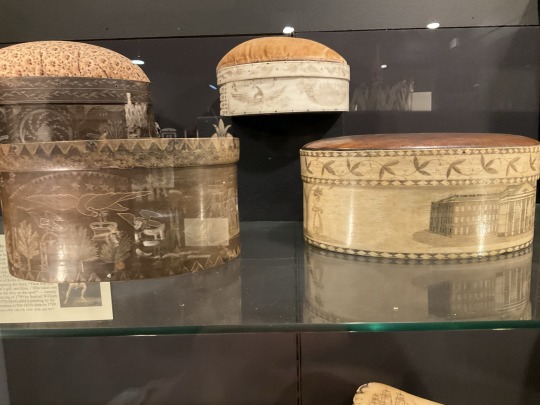
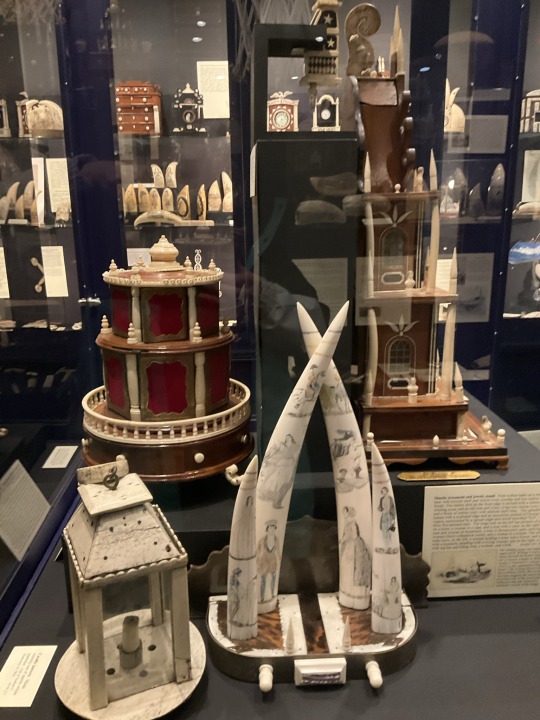
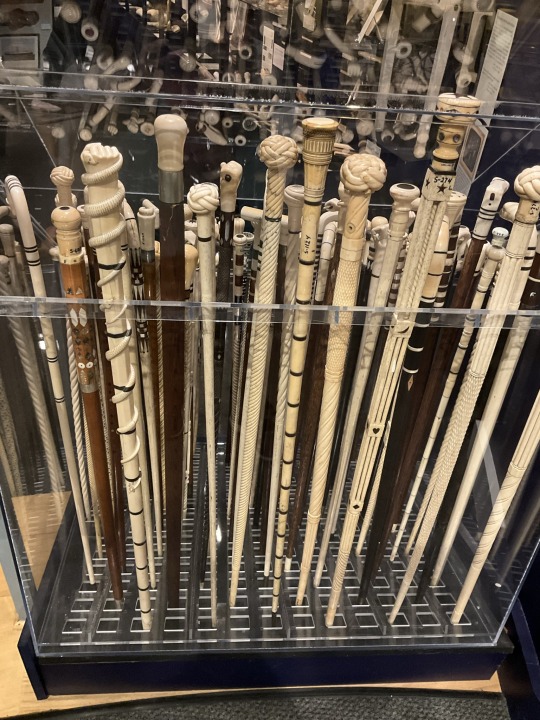
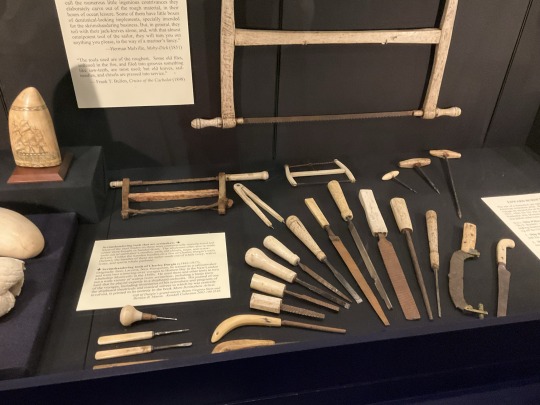
Just more beautiful scrimshaw. What a collection! Tools, ornaments, boxes, canes, yarn swifts. Sailors worked on these during downtime at sea.
0 notes
Photo

Front Door - Mudroom
White front door and beige walls provide inspiration for a remodel of the transitional entryway.
0 notes
Note
I have to tell you that, as a New Hampshireite, any American Thranduil is is now automatically from my state or ay least New England after reading Kairos, and any immigrant Thranduil living in the states would live here as well (He would thrive in our "do not fucking talk to me I don't know you who are you" culture, fits right in).
You are also VERY correct about him being a Philips Exeter kid, when I tell you I chuckle every time I think about it... My piece of wisdom for this is that if Oropher (old money and keen on people knowing that) had to choose a place in NH to live, it would be Bedford. That's where all of the obnoxious wealthy people with lake houses on Winnipesaukee or beachfront properties on Cape Cod who take weekend golf trips live, and Oropher reeks of that. Personally I find the idea of him dragging a very reluctant teenage Thranduil to the green extremely funny; Thranduil's just dragging his feet the entire time. He'd fucking hate golf.
You're so right! During a discussion with Bard in Chapter 12, Thranduil has this exchange about golf:
The look on Bard’s face says exactly how he feels about this. “Like what? Golf?”
Golf. Thranduil cannot imagine anything more mind-numbingly dull than playing eighteen holes of golf. “Or sailing,” he says, and Bard snorts. “Perhaps croquet.”
And of course his hatred of golf is born from experience. First of all I think he's just too tall to play golf comfortably, and then as far as ways to interact with his environment go, that's probably the least interesting. I'm sure Oropher saw it as a fun activity or (in the best possible interpretation) a way to bond with his son; meanwhile, Thranduil was probably wondering what he did to deserve that kind of punishment.
As for New Hampshire!Thranduil, I'm so glad you like him! It's always an honor when people who grew up in/live in New England are happy with the way both he and the location are portrayed. All the details in your ask made me smile. I always appreciate learning more.
Thank you for the ask! The next chapter of the fic should be up within the next few hours.
7 notes
·
View notes
Text
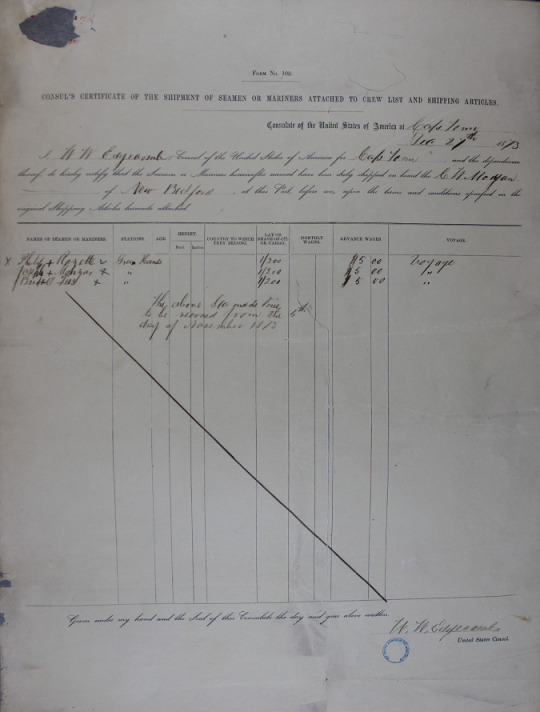
Consul's Certificate of the Shipment of Seamen or Mariners Attached to Crew List and Shipping Articles for the Whaling Bark Charles W. Morgan
Record Group 36: Records of the U.S. Customs ServiceSeries: Crew Lists of Whaling Vessels
Form No. 109 CONSUL'S CERTIFICATE OF THE SHIPMENT OF SEAMEN OR MARINERS ATTACHED TO CREW LIST AND SHIPPING ARTICLES. Consulate of the United States of America at Cape Town Dec 27th 1873 I, W. W. Edgecomb, Consul of the United States of America for Cape Town, and the dependence thereof, do hereby certify that the Seamen or Mariners hereinafter named have been duly shipped on board the C. W. Morgan of New Bedford, at their Port before me, upon the forms and conditions specified in the Original Shipping Articles hereunto attached. NAMES OF SEAMEN OR MARINERS. Philip Razette Joseph Monzar Bride Fees STATIONS. Green Hands " " AGE. HEIGHT. Feet. Inches. COUNTRY TO WHICH THEY BELONG. LAY OR SHARE OF OIL OR CARGO. 1/200 1/200 1/200 MONTHLY WAGES. $5 00 $5 00 $5 00 VOYAGE. Voyage " " The above Seaman's time to be recorded from the 5th day of November 1873 Given under my hand and the Seal of this Consulate the day and year above written. W. W. Edgecomb United States Consul.
23 notes
·
View notes
Text

THIS WEEK AT KOLAJ MAGAZINE
Baroque Grunge, Splendid Aloneness, & a PoetryXCollage Artist Spotlight
FROM THE ARTIST DIRECTORY
Psychological Interpretation of Reality
Emily Denlinger | Cape Girardeau, Missouri, USA
FROM THE ARTIST DIRECTORY
Baroque Grunge
Katharina Barrett | Eureka, California, USA
COLLAGE BOOKS
Collage Your Life
by Melanie Mowinski
COLLAGE IN MOTION
Such Splendid Aloneness
Stephanie Barber | Philadelphia, Pennsylvania, USA
COLLAGE ON VIEW
Cut Paste Create
The Art of Collage at Bedford Gallery in Walnut Creek, California, USA
SPOTLIGHT ON POETRYXCOLLAGE ARTIST
Zeke Shomler
in Volume 6 of PoetryXCollage
Read the full update
*****************************
Kolaj Magazine, a full color, print magazine, exists to show how the world of collage is rich, layered, and thick with complexity. By remixing history and culture, collage artists forge new thinking. To understand collage is to reshape one's thinking of art history and redefine the canon of visual culture that informs the present.
SUBSCRIBE | CURRENT ISSUE | GET A COPY
SIGN UP TO GET EMAILS
#collage#collage art#collage artist#art#artist#art history#art project#art show#vintage art#art books#art education#artistic#contemporary art#artwork#modern art#fine art#artist residency#artist books#contemporary artist#artist portfolio#artist book#artist profile
2 notes
·
View notes
Note
If he could just make it to the end of Enoch's antics. That's exactly what it was. He was being played, and he was being played like a fucking fiddle. Few things bothered him as much as this. Being taken for granted, sure, happened all the time. Being underestimated; same thing.
This was just torture.
But, he would answer the question in earnest. He didn't have to ask for a repeat. He'd read the book enough times to know verbatim.
“I put a few shirts in my old bag, tucked it under my arm and headed to Cape Horn and the Pacific Ocean.”
Chapter Two, The Carpet-Bag.
Rune turned, inching closer. He pointed to the next line. "Quitting the good city of old - old Manhatto, I duly arrived in New Bedford. It was a Saturday night in December." He looked to Enoch expectantly. Now, your turn, in Dutch.
Getting to the second chapter had been a feat. Progress was slow and clumsy, but he had persisted through the struggle and myriad of mistakes. He was begging to grasp some words, but having a literal translator sitting nearby made it significantly easier.
Enoch was ready to continue this charade, but Rune’s sincere response wore down those walls. Especially the way the mage leaned in, close enough to pick up on that faint smell of mint he often associated with his mentor. Damnit.
Fine. He wouldn’t torture the poor man anymore.
You win for now.
His tone shifted, becoming more natural as he slowly read through the passage, finger tracing under each word as he struggled. His vowels flattened, and while his English accent was there, it wasn’t nearly as bad when he was actually trying.
“Nadat ik de goede stad van het oude Manhatto had verlaten, kwam ik terecht in New Bedford. Het was een zaterdagavond in December”
He looked back at Rune once finished.
Happy?
2 notes
·
View notes
Note
Nancy, the People article mentioned the wedding happened in Cape Cod. Doesn't Cape Cod has something to do with JS?
LOL.
No. Jenny lives near New Bedford. That has more to do with the ferrys that go back and forth to Martha's Vineyard.
7 notes
·
View notes
Text
17 June 2023
Living History
Evesham and Broadway
17 June 2023
The following blog contains imagery of Nazi Germany and the Waffen-SS.
I make absolutely no bones about my love of living history in all its forms. At its very best, it’s an entertaining way to get people to learn about the past. At its worst, well, it’s still entertaining. Sure, there are pitfalls - but I think that’s true of any method of conveying history - and there’s certainly a time and a place for it (which we will get into in a few weeks), but ultimately I’d say I support it.
Today we drove from Bedford across the Midlands to Evesham, where a reenactment event was being held - Wartime in the Vale. Obviously this was reenactment of a military bent, and if someone questions being opposed to war but visiting such events, I once again bring up Wells’ quotation about tin widows. The overwhelming majority of the groups present represented the Second World War, although there were some First World War Tommies and a few Cold War impressions.
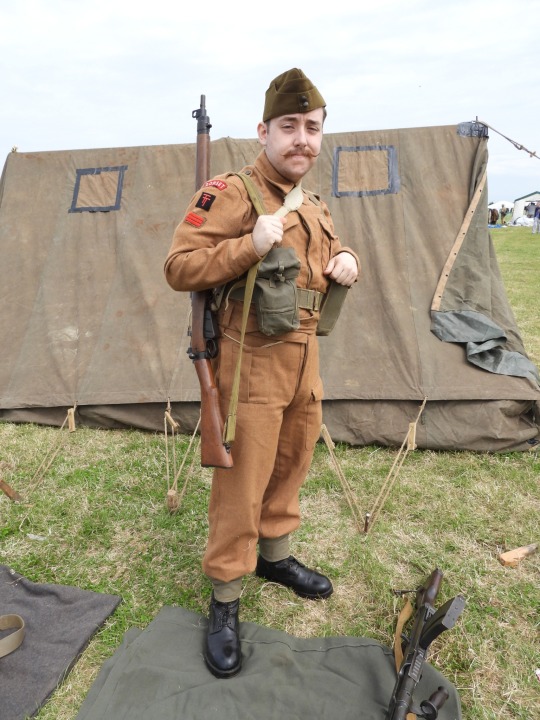
One part of reenactment that tends to raise eyebrows and start debates is the representation of Nazi Germany, in particular the Waffen-SS. I’m not so worried about regular Wehrmacht and Fallschirmjager impressions (unless they try to imply that said organisations were squeaky clean and never did anything wrong), but I must admit some discomfort about the SS. I decided today that I’d talk to one of them - a fellow named Samuel who was part of a late-war impression of the 1st SS Division - about why he did it. It was a very eye-opening conversation for me. Basically, as he put it, the point wasn’t to glorify the Waffen-SS, it was to educate the public about who they were and what they did. What really struck me was how he told me about an Israeli couple who thanked him for doing that, and how he pointed out that there were Poles and Jewish people in the group.
I still can’t say I’d be comfortable with personally reenacting the SS, but I think he made a good case for why he and his group did. It would certainly be hypocritical of me to say that I think reenactment can be a usual educational tool, and then ban all the things that make me uncomfortable from being reenacted. I know it’s given me a lot to think about - I’d be interested in hearing what others think too.
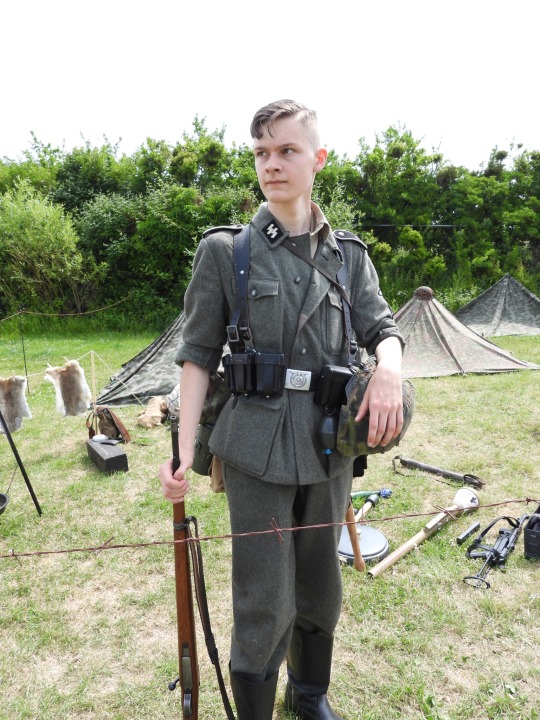
A few more shoutouts I’d be remiss if I didn’t make - to the ex-Tube driver who works with neurodivergent people in the 6th Airborne group, to Harry from the 1st Dorsets who I had a nice conversation with, and to the chap from the Royal Engineers group that showed me all the Lee-Enfields. As for unique impressions, I was particularly impressed by the British Cold War group - I’ve seen them before but they’re always good - to the Winter War Finns, and to the WAS(B) (Women’s Auxiliary Service Burma) group.
(There was also a guy doing a Cape Town Highlanders impression, but he was on his own so I can’t credit a group for that.)
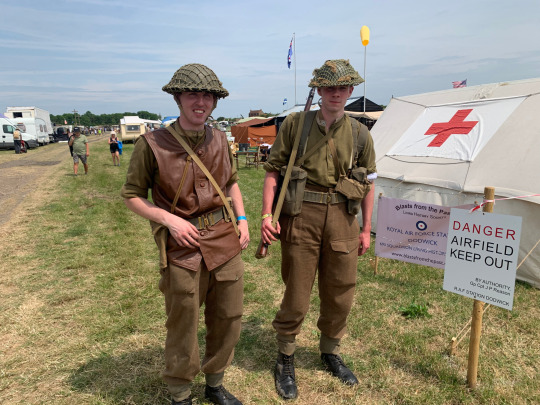
We left just before two and went on a jaunt to Broadway, a village in the Cotswolds that I’ve been to before, but which we thought it’d be good to show my stepfather. While he and mum looked around the village, I hung around Broadway station, the terminus of the Gloucestershire and Warwickshire Railway, and watched the train arrive. This was headed by the Merchant Navy-class No. 35006 Peninsular & Oriental S. N. Co. This was an old friend from my last visit to this part of the world, but I’m never definitely unhappy to see a Bulleid pacific.

I arrived back to Bedford satisfied and more than a little sunburnt. Tomorrow we leave for London, and on Monday, the study tour finally begins. I am firmly on the road to the Dardanelles now…
#second world war#reenactment#cw nazi germany#cw guns#railway#steam locomotive#merchant navy#gwsr#heritage railway#steam railways
5 notes
·
View notes
Text
Night falls, so it’s time for a longass wooey post as usual.
I shared, in a much more prose-y capacity the trajectory of Mr. Martin’s life, but there was a significant chunk I didn’t include in that old post because I hadn’t dug into it yet. And there might be yet another additional Life Chapter that I’m not currently aware of, but so far everything I’ve learned from him falls in one of three categories: childhood, whaling, and the Cook Islands. He didn’t have a long life and certainly didn’t think much good about his first 21 years, so that may be it. But the fact that his time on Aitutaki takes such a prominent place in his memories when it was a really brief part of his life is poignant to me.
The Aitutaki bits I saw from him were some of the most interesting to me, because it was something that I had no prior knowledge of (unlike whaling, where I always had a some doubt that because I knew so much of the history I was just making a string of lucky guesses). With the culture and language of the Cook Islands I didn’t know anything, and when I started to research more into it after the fact, I found so many things that matched what I saw. How houses were constructed, what certain homegoods and tools were, specific dishes and how they were presented and eaten, what people wore, what their names were, words in a language I had no familiarity with but ended up being Actual Words that contextually worked with the situation…
He didn’t finish out his third voyage. On the last leg of the journey, he requested a discharge at the Cook Islands just after his 27th birthday had passed (*somewhat corroborated. The logbook said 6 men came for their discharge and it was granted, and they were dropped off ashore but the log doesn’t list their names). His motivation was that he didn’t see the point of going all the way back to New Bedford just to ship out again. He had no love for New England, and didn’t want to spend months of boredom and bad weather leaving the cruising grounds just to go back to them. He didn’t want to round Cape Horn twice again. Since he was in the South Pacific already, he thought it’d be good to cut to the chase and just sign on with another vessel that was halfway through its voyage and looking for additional recruits. Like always, it had nothing to do with money—he knew he’d whale til the end, so he was fine cutting whatever losses may have come from taking a discharge pay instead of a cut of his ship’s profits. His plan was to recover on the island and then ship out with another whaler that touched down there. The fact that he thought it looked warm and beautiful helped elevate it over the prospect of sailing around the Horn again, too. But Aitutaki became so much more important to him than a temporary stopping point.
He lived there for a few weeks, no more than a month and a half. He stayed with a family—a young couple with two very small children who were maybe 2 & 3 years old. He traded some things with them, a shirt, a fid, and earned his keep by helping them (and other community members) with tasks around the island. He’d go out with a group of other men and help knock breadfruit out of trees with poles; as a harpooner he had a good arm for it. He’d help set up fishing nets and corral the fish into them. He’d carry baskets of drinking coconuts back to the home, or materials needed for repairs, or stones for fires. He laughed a lot with this couple, enjoyed their company. There was a language barrier but he didn’t mind it. He never talked much anyway, so being able to communicate more through pantomime, through body language, through not having to talk at all but just allowing for contented quiet was refreshing to him. Their little kids found him quite a novelty. They’d climb on him, pull his hair, shrill and run around him. He tolerated it, was amused by it. And he liked seeing how these parents interacted with their children. He had a bad home life growing up, had an awful relationship with his own parents so it was bittersweet seeing this one. Seeing what that relationship was supposed to look like. It bummed him out a little, but he liked seeing the warmth.
The first night he arrived on the island he met a girl. Gave her a roll of blue fabric from his seachest by way of introduction. She was the one who later introduced him to the above family when he asked if there might be a place for him to stay in the interim while waiting for another ship. He thought her very charming, and over the weeks that he was there they carried on an intimate relationship, albeit not in a way that they made known to her community. She was gentle with him—he’d never known anyone who’d treated him with such gentleness. It was the first time that he felt like he could actually let his guard down with someone, just a little. He felt cared for by her, and wanted to care for her in turn during the time he was there.
Between her, the couple he stayed with, and other community members he worked and played around with, was a brief window where he felt like he almost had a family for the first time in his life. His sense of belonging on whaleships, while so very strong and so much a part of him, wasn’t connected to people. It was connected to the work and his skill and sense of purpose in that work. In Aitutaki it was the people. He felt safe there. I don’t know if he’d ever felt safe before then. He was of course at ease and confident on a whaleship and ports of call, but that’s not the same as feeling ‘safe’. It was a different sort of belonging he felt here. When he laid in the family’s kikua by the door in the dark and quiet, and could hear the breeze rustling the trees and the thatch on the cottage, and the ocean, and the gentle snoring of the parents sleeping further inside with their children, he felt a different sort of home.
Once I was looking at videos of the lagoon in Aitutaki and they just like…grabbed my throat, seeing them. I told him he could’ve stayed there, that he may have lived longer if he did. But he had never seen that as an option. He didn’t even consider it because it was so different from the life he knew, no matter how content it made him in the moment. There was always an unsettled restless undercurrent within him while he stayed there because he felt so sure that it was temporary, that he couldn’t stay. What he knew and what he built his life out of was on those ships. Overhauling that belief never really crossed his mind.
Eventually a ship made a provision stop there—he called it a ‘French’ ship, but also said he was on the ‘Napoleon’ which was a Nantucket vessel. I don’t know if it was a real French ship he took passage on to a port to sign onto an American whaler, or if he was conflating the ‘French’ name of this American ship in his memory of it. Either way, Martin sought out the girl who had done him so many kindnesses, kindnesses more significant to him than he thinks she knew, and bid her farewell. He went to the couple’s home to collect his belongings—the mother was there and he thanked her for allowing him to stay. The father wasn’t there, and with time pressing Martin wasn’t able to say goodbye to him…that beat him up a bit because he’d grown quite close to him.
He signed on with an American whaler that had stopped there mid voyage, just as he planned. At first it felt good and comfortable to be back aboard. But soon after he started to wonder if he’d made the right decision. He felt off kilter from the rest of the crew, being new. He didn’t have the same reputation or leverage he would’ve had had he signed on to a new ship with an advanced rank at the start of a voyage. He had to prove himself all over again, which he did quickly enough, but it still made him unsure of where he stood there. He once again felt emotionally distant from his shipmates in a way that definitely wasn’t a new experience, but suddenly it bothered him a bit. There were times that he missed the people he left on Aitutaki. He wondered after them sometimes.
As it’s nearing the date I got for his birthday, I asked him to show me one. I got his 28th, which would’ve been a year after he first went to Aitutaki. This was also the last birthday he’d live to see. He’s on this fourth vessel—this vessel I have no historical record connecting him to like the others, but feels like it happened. It’s dark and he’s laying in his bunk, holding his protection certificates. I ask what he feels on his birthday, and I just get a dull loneliness. Late that evening he’s taking stock of his life. He didn’t tell anyone it was his birthday, he never does because he doesn’t see the point in doing so. They were never much of a big deal, but this one’s a somber reflective moment for him. He feels pride in being a whaleman; it’s the only thing he’s proud of, but it’s getting hard on him. He feels proud, but he’s lonely, he misses the islands sometimes, he sometimes regrets signing on to a ship mid voyage, and whaling is getting hard on his body. He’s starting to hurt, he’s starting to get tired. It’s a sort of resignation that in that moment he doesn’t feel sure in his decision for being here like he did on the other ships. Those feelings always go away when he’s in his element and in the thick of the work, and the world feels right to him again. But that night on his birthday as he’s getting older and knows that he’s going to one day die out there in this world, he feels a twinge of sadness.
The last 7 years of his life really meant something to him, but that handful of weeks he spent in Aitutaki held a similar weight to the 7 years where he found his sense of self as a whaler. And I wonder sometimes how the people he knew on the island fared in their own lives. I wonder how his life may have gone had there been more time for him to mull over how that handful of weeks changed him. It makes me sad, but in a way that I’m happy that he was able to find something like that before the end of it.
#mister martin#i care about him sooooo much#im normal until 10:30pm and then I’m like SOURCE: REINCARNATION????
23 notes
·
View notes
Video
Geeps And Grass por David Blazejewski
Por Flickr:
The Bay Colony Railroad was once a promising and progressive little shortline that was born in those halcyon post Staggers days when branchlines were being shed nationwide and startups were being formed all over to step in where class 1s were stepping out. For decades the BCLR ran a disconnected group of branches and spurs around the Eastern Bay State, some of it as a contract/concession on state owned properties and some on lines they owned the perpetual freight rights. Over time traffic dried up on some routes and other routes were abandoned. And on Jan 1, 2008 this railroad's 25 year operating contract with the Commonwealth expired and they lost the bid to continue operating the Cape Main and all properties east of Middleboro, the vast majority of their trackage. But the rights on the Millis Branch and the Watuppa Branch near New Bedford belonged to the BCLR outright so they continued to serve those two tiny branches. However, the Millis line lost its major customer in 2009 when the GAF shingle plant shut down leaving that line just about moribund, this little 7.5 mile stretch is still very much a going concern. They currently have just two active customers on their line extending east from the wye at Nash Road in New Bedford as far as Mid City Scrap in Westport. However, in years past the route (which dates from 1875 and was once part of the Old Colony system) was much busier and continued on to Fall River to serve the Watuppa mills in the upper part of the city. Those outer 4 miles saw their last train operated by Conrail in 1980, but the rails remained in place rusting for nearly three decades before finally being lifted and turned into a train. The BCLR of today runs as needed but usually at least once or twice a week to interchange cars with Mass Coastal which comes down from Taunton. Here they are paused just east of Old Reed Road at about MP 5.4 getting ready to head east to the MC interchange in New Bedford. Chopped blue nosed GP9 1705 was originally built Apr. 1956 as Great Northern 704. Dartmouth, Massachusetts Friday September 1, 2023
4 notes
·
View notes
Text
DEPARTED CAIRNS

View On WordPress
0 notes
Text










4/20/24 I met an old friend from residency days in Palo Alto. Liz Page was the partner of a good friend Kristin, who I met in the OR at Valley Medjcal Center in San Jose. We all adopted girls. They were 50, I a young 44. Liz gave a good report about her Vietnamese daughter, Chloe. We enjoyed a beer and good meal at the Resturaunt, Moby Dick. 2-3 hrs. Great catch up.
On to the New Bedford Whaling Museum. The best I have seen. 3 rearticulated whales hang from the ceiling. Whaling boat, glass of New Bedford. Remember the book/movie The Perfect Storm? That was New Bedford.
Back to the Cape to gather my thing in preparation for departure to points south. Thank Leslie & Lynne for 13 wonderful night. At your home.
Sent from my iPhone
0 notes
Text
Record-breaking downpours from thunderstorms cause flooding across Nova Scotia
An unusually long procession of intense thunderstorms dumped record amounts of rain across a wide swath of Nova Scotia on Friday and Saturday, causing flash flooding, road washouts and power outages.
Torrential downpours started Friday afternoon across the Halifax region, dumping more than 200 millimetres of rain in the Hammonds Plains, Bedford and Lower Sackville areas. The port city typically receives about 90-100 mm of rain during an average July.
Based on radar estimates and unofficial observations, Environment Canada said some areas may have received more than 300 mm in 24 hours. Radar maps show the heaviest rainfall extending along the province's southwestern shore to a point north of Halifax.
Widespread flooding has also been reported in Lunenberg County, which is west of the Halifax region.
As Emily Noseworthy surveyed a washed-out bridge on the Bedford Highway on Saturday afternoon, the Halifax resident said she was stranded in the suburb north of the city, unable to get to her job on the Dartmouth side of Halifax harbour.
"I'm sending them pictures," she said, referring to her employer at the Dartmouth Crossing big-box shopping area. "I can't move."
On Friday night, water levels rose so fast in the Bedford area that volunteers with Halifax Search and Rescue were using small boats to rescue people from inundated homes.
In the Hammonds Plains area, northwest of the city, flooding washed out driveways and the shoulders of many roads.
That's the same area where where 151 homes and businesses were destroyed by a wildfire that started on May 28th, forcing evacuations that affected 16,000 residents. And for much of the past week, the Halifax area has been sweltering under an immobile dome of humidity -- a rare event so close to the coast.
On Twitter, one resident wryly predicted: "Locusts next week."
And it was only last fall that post-tropical storm Fiona descended on the Atlantic region, killing three people, flattening scores of homes and knocking out power to more than 600,000 homes and businesses. Fiona was the most costly weather event in the region's history, causing more than $800 million in insured damage.
"It's pretty obvious that the climate is changing -- from Fiona last year to the wildfires in the spring and now flooding in the summer," Halifax Mayor Mike Savage said in an interview.
"We're getting storms that used to be considered one-in-50-year events ... pretty regularly."
While the official statistics have yet to be recorded, it's believed the Halifax region has not seen this level of rainfall since Aug. 16, 1971, when hurricane Beth made landfall near the eastern tip of mainland Nova Scotia and then roared over Cape Breton. At that time, almost 250 mm of rain fell on the Halifax area, causing widespread flooding and$3.5 million in damage.
"I'm old enough to remember that one," Savage said. "But the consistent, violent nature of the thunderstorms last night and into this morning were frightening. It's put a lot of people in a tough position. If you've ever had water in your basement, it's not a fun situation."
At one point, more than 70,000 Nova Scotia homes and businesses were in the dark as lightning strikes knocked out electricity.
Prime Minister Justin Trudeau acknowledged the widespread blackouts and damages at an unrelated afternoon event in Toronto, saying the federal government stands ready to provide whatever support the province and its residents may need.
"Obviously this is just a time when we're thinking of families going through an incredibly difficult moment," he said, noting federal officials have been in touch with their provincial counterparts. "We will be there for them while they are going through this, but also through the difficult days and weeks to come."
Meanwhile, residents in several communities were warned to stay off the roads, including several major highways. Online maps produced by the Halifax region show more than 30 road blockages, mainly to the north and west of the city.
When Chantal Blanchard and Travis Hartley-Cox left their Halifax-area subdivision around 7 p.m. Friday to head into the city, "all hell was breaking loose," Blanchard said, adding the water on the roads was like a "white-water rapid."
Their return trip took two hours as they carefully dodged abandoned vehicles on washed-out roads. But they eventually reached a roadblock.
"The police officer said the road was broken right up ahead," Blanchard said.
The pair then waded through waist-deep water, keen to get home to their three dogs.
Paula Finlayson, a 25-year resident who lives in the Hammonds Plains area, described the storm as "awe-striking." Surveying a washed-out bridge and overland flooding that looked more like a large lake, Finlayson said she felt claustrophobic when she realized she was trapped in her subdivision.
"It's so crazy, it's bizarre," she said, looking at the water rushing beneath the crumbling bridge. "This is major."
Rainfall warnings were still in effect Saturday for central and eastern Nova Scotia, including Cape Breton. And an additional 40 to 100 mm of rain was expected by Saturday night.
In some areas, submerged streets were littered with abandoned vehicles. Halifax RCMP said residents shouldn't leave home unless it's an emergency.
Scores of images shared on social media show cars plowing through deep water. And one video from the Windsor Junction area north of Halifax shows firefighters standing on the roof of their submerged pumper truck. On the normally busy Bedford Highway, a beaver was spotted Friday swimming across the submerged road.
In the Halifax area, two evacuation centres opened on Friday night and were kept open on Saturday.
"We knew there was some pretty strong rain coming," the mayor said, adding about 10,000 lightning strikes were recorded as the storm marched across the province. "But I don't think any of us expected what we got from last evening through this morning."
This report by The Canadian Press was first published July 22, 2023.
This story was produced with the financial assistance of the Meta and Canadian Press News Fellowship.
from CTV News - Atlantic https://ift.tt/J4Kt6Va
2 notes
·
View notes
Photo

Mary Du Caurroy Russell, Duchess of Bedford, DBE, ARRC, FLS (née Tribe; 13/26 September 1865 – ca. 22 March 1937) was a British aviator and ornithologist. She was honoured for her work in founding hospitals and working in them during the First World War. She later financed and took part in record breaking flights to Karachi and Cape Town.
#Mary Russell#XIX century#women in history#XX century#people#portrait#photo#photography#Black and White
8 notes
·
View notes
Photo

Bishop Charles Manuel (Sweet Daddy) Grace (January 25, 1881 - January 12, 1960) was born Marcelino Manuel da Graca in Brava Cape Verde Islands. He was the founder of the United House of Prayer for All People. Born off the coast of West Africa on Brava, Cape Verde Islands, he was one of nine children born to Emmanuel and Delomba da Gracia. In the early 1900s, the family moved to New Bedford, Massachusetts where he worked numerous jobs before founding the House of Prayer in 1919 in West Wareham, Massachusetts. In 1923, the second House of Prayer was established in Egypt and three years later the United House of Prayer for All People, was founded in Charlotte. Poor African Americans in urban areas were drawn to his ministry. Operating under Pentecostal-Holiness practices, followers witnessed musical brass shout bands, miraculous physical healings, and mass baptisms. Under his leadership, the United House of Prayer churches experienced growth and economic prosperity through the purchase of a real estate in the US and abroad. The church received revenue from donations and the sale of products named after its founder. Critics opposed his popularity, flamboyant appearance, and lavish lifestyle that included wealth, jewelry, and mansions. The Internal Revenue Service and numerous individuals estranged from the United House of Prayer brought lawsuits against Grace and his religious organization. None were successful. It is estimated that Grace founded hundreds of House of Prayers across the US and overseas with an estimated following of over 500,000 parishioners. #africanhistory365 #africanexcellence https://www.instagram.com/p/Cn2GwV6LCzY/?igshid=NGJjMDIxMWI=
2 notes
·
View notes